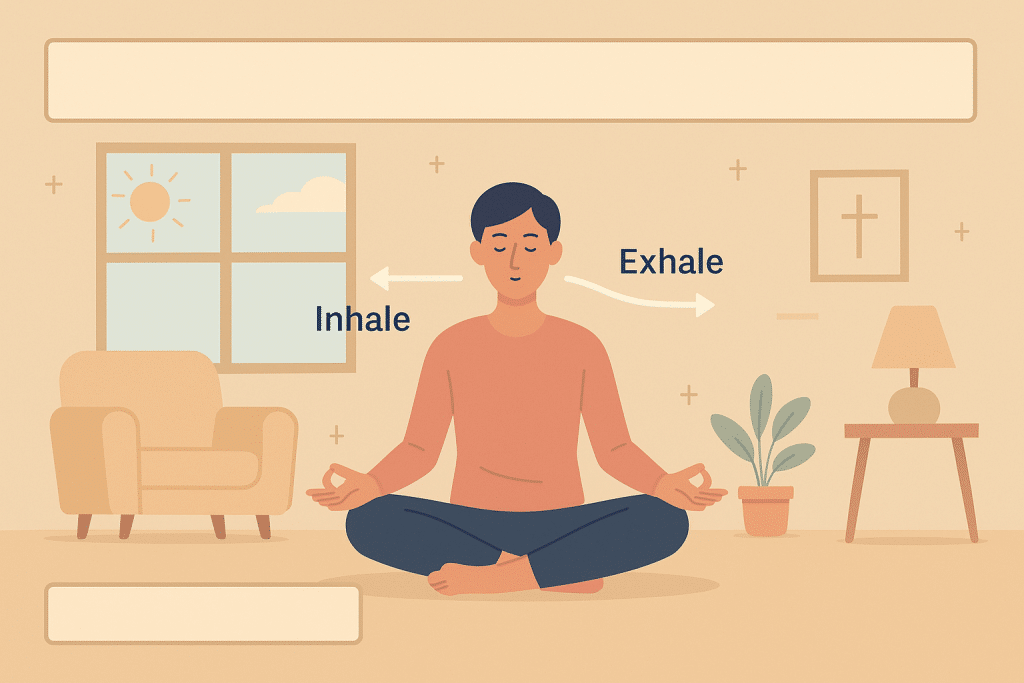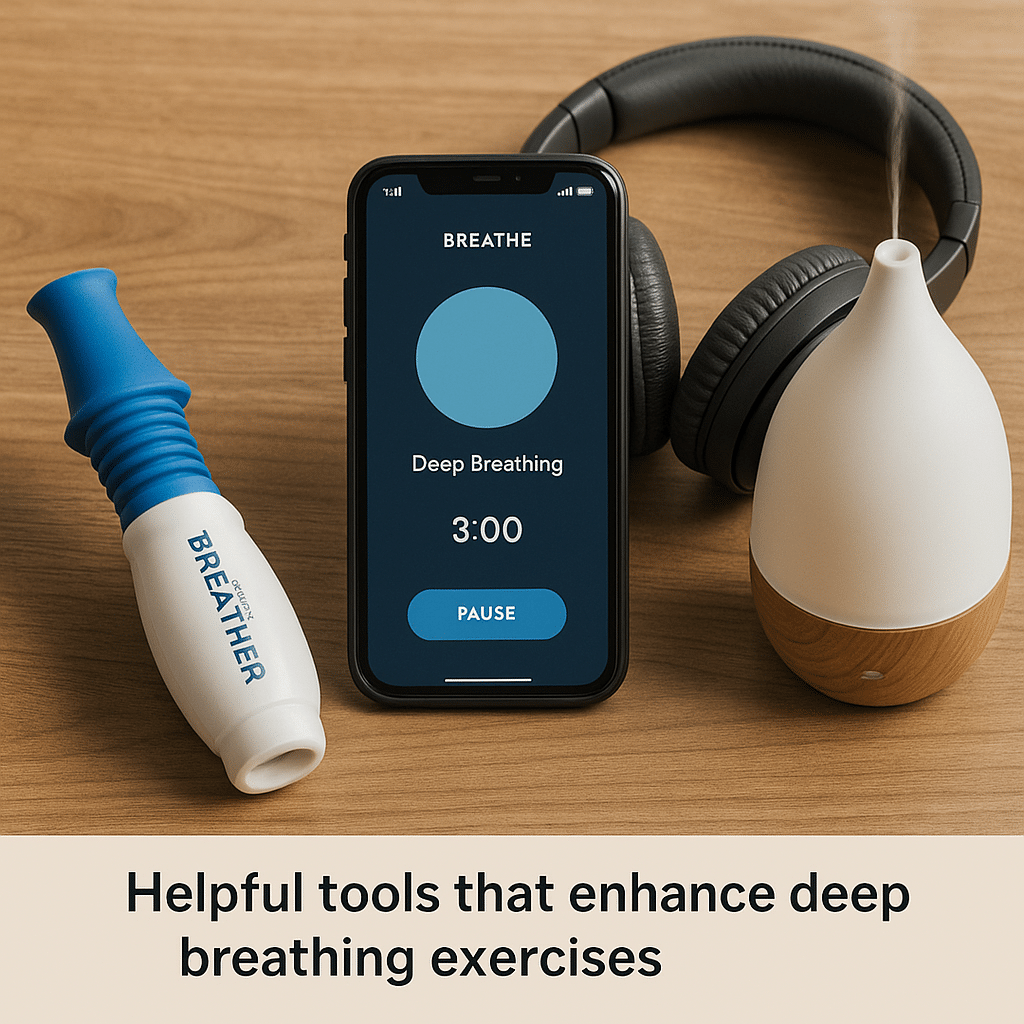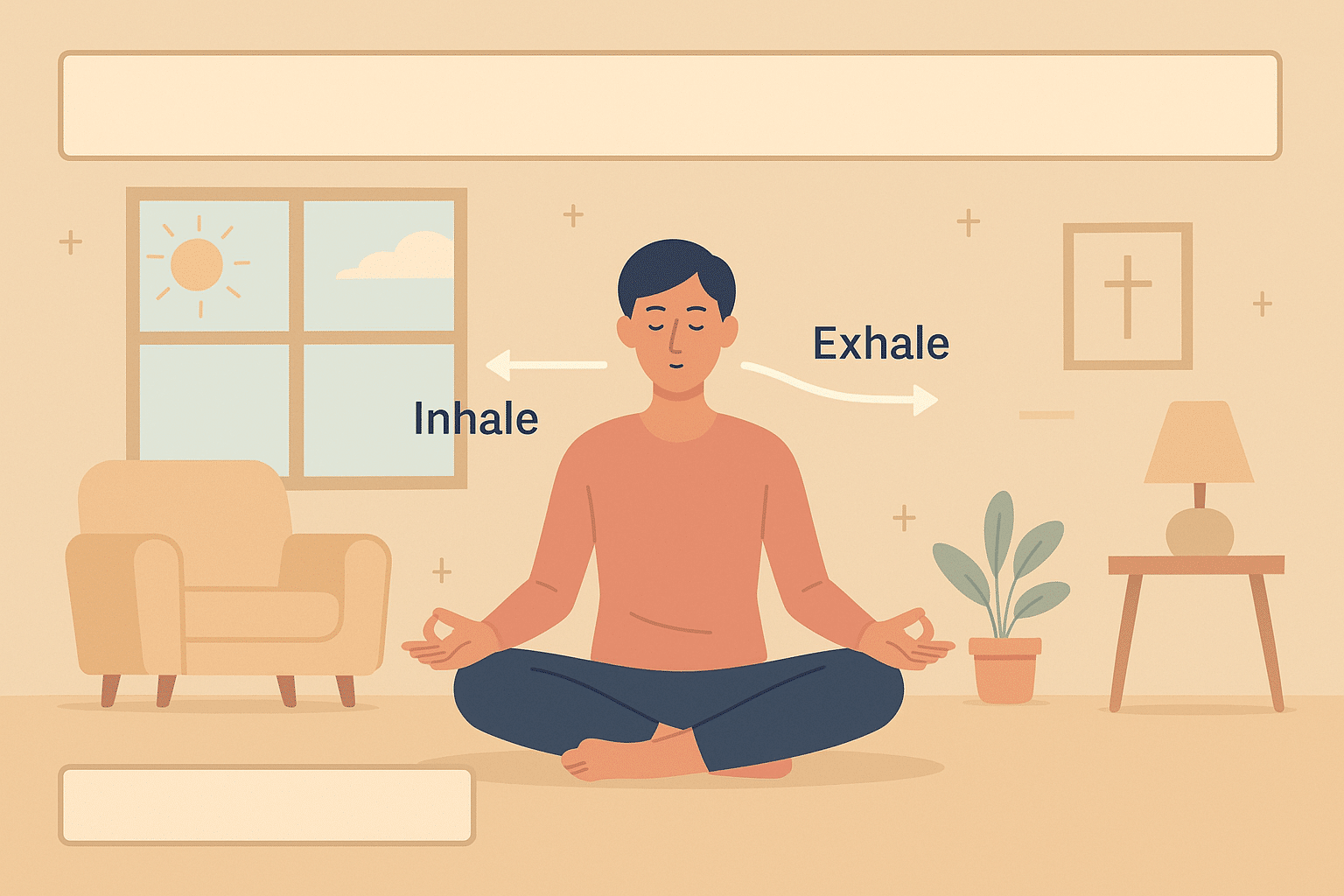Deep Breathing Exercises: A Christian Guide to Calm Anxiety
Estimated reading time: 7 minutes
Deep Breathing Exercises: An Introduction
Anxiety can steal clarity, drain energy, and blur our awareness of God’s presence. Thankfully, Scripture and science agree that the simplest answer often begins with the next breath. The proven practice of deep breathing exercises offers a fast, drug‑free way to slow a racing heart and refocus an anxious mind. While your lungs draw oxygen, your soul can draw near to Christ.
In this guide you will learn why anxious breathing feels so uncomfortable, how controlled breathwork triggers the God‑designed calming branch of the nervous system, and which biblical promises align with every steady inhale. You will also discover step‑by‑step techniques, practical tools, and trustworthy products that make a life‑changing routine simple to start today. Because the focus is holistic, we connect physiology, psychology, and theology so that your body, mind, and spirit heal together.
Keep reading if you want actionable answers grounded in research, respectful of Christian faith, and friendly to modern medicine. By the final section you will know exactly how to integrate a two‑minute breathing ritual into devotions, how to pick a helpful app or portable trainer, and how to download the free study PDF that supports every claim. Freedom begins with one slow breath; let’s take it together.
How Deep Breathing Exercises Calm Your Nervous System
Modern imaging shows that the act of slow breathing is not merely relaxing; it literally shifts the brain from alarm to rest. When you inhale deliberately through the diaphragm, stretch sensors send a message along the vagus nerve. That signal tells the heart to beat more slowly, lowers blood pressure, and reduces the stress chemical cortisol. Consequently, after only sixty seconds of practice, the fight‑or‑flight cycle begins to fade and logical thinking returns.
Researchers at the Salk Institute mapped a frontal‑cortex circuit in 2024 that can override panicked breathing and restore calm in laboratory animals. Similarly, Harvard Health reports that a daily slow‑breathing practice improves mood and sleep for human participants. These findings make sense: God engineered our autonomic system with a built‑in brake pedal. Deep breathing exercises press that pedal on demand.
Because evidence is growing, clinical guidelines from the American Heart Association now include paced respiration as an adjunct therapy for hypertension. Christian counselors also praise breathwork exercises for helping clients stay present during talk therapy. When practiced consistently for eight weeks, participants in a peer‑reviewed trial recorded a thirty‑five percent drop in cortisol and a marked increase in focused attention. Better still, no side effects were reported, proving that a few mindful breaths can be safer than an extra mug of coffee.

Breathing Through Scripture
Scripture celebrates breath from Genesis to Revelation. In Eden “the Lord God breathed into Adam’s nostrils the breath of life,” and on the cross Jesus “breathed His last” so that we could breathe freely forever. Not surprisingly, the Bible ties physical respiration to spiritual renewal. Psalm 46:10 invites us to “be still,” an instruction that perfectly matches the slowing of respiratory pace.
Furthermore, many believers have practiced breath prayer for centuries. They inhale a promise such as “Lord Jesus Christ,” then exhale a request like “have mercy on me.” This pattern unites bodily rhythm with unceasing prayer. When you repeat a verse while exhaling slowly, you lengthen the out‑breath, which scientists know activates parasympathetic tone. Thus theology and physiology converge in one humble act.
Importantly, Christian breathing practice is not about emptying the mind. Instead we fill thought life with truth. Philippians 4:6–7 commands that we present every anxiety to God with thanksgiving; breathing calmly while reciting this text reinforces the command in nerves and neurons. Because faith relies on grace, not grit, we accept supportive tools joyfully—medication, counseling, and deep breathing exercises can all be gifts of common grace. “Let everything that has breath praise the Lord.” Each inhale becomes praise, each exhale becomes surrender.
Practice Guide: Controlled Breathing Techniques Step‑by‑Step
Below you will find a compact guide to four controlled breathing techniques. Read the steps, pick one, and practice twice a day so the pattern feels natural when stress strikes.
Belly breathing – Place a hand on the abdomen and another on the chest. Breathe in through the nose for four counts, allowing the lower hand to rise. Pause briefly, then purse the lips and exhale for six counts. Repeat for two minutes. This drill trains the diaphragm and is ideal for morning devotions.
Box breathing – Inhale for four, hold for four, exhale for four, hold again for four. Visualize a square and mentally trace its edges. Because the counts are equal, the rhythm builds focus and is perfect before a meeting.
4‑7‑8 relaxing breath – Empty the lungs with a gentle “whoosh.” Close the mouth, inhale through the nose for four counts, hold for seven, then exhale through the mouth for eight. Longer exhales deepen calm and help at bedtime. Caution: sit or lie down the first few times.
Physiological sigh – Take one short nasal inhale, add a second shorter sip of air, then release a long, slow sigh through the mouth. Two cycles can halt a panic spiral in public.
To anchor practice, pair each technique with a verse. For example, inhale “God is my refuge,” exhale “I will not fear.” Consistency produces results; therefore schedule the exercise after coffee, lunch, and lights‑out. With regular rehearsal these deep breathing exercises will reduce baseline stress within weeks.

Products That Support Slow Breathing Practice
Practical tools can turn intention into habit. Below are three options that thousands of believers have used successfully. None are required, yet each one removes friction so your deep breathing exercises become a lasting part of daily discipleship.
- The Breather® Respiratory Muscle Trainer – Strengthens the diaphragm in five‑minute sessions and lowers resting heart rate.
- Calm App – Provides timed breathwork, scripture meditations, and gentle reminders for consistency.
- Core Meditation Trainer – Vibrates with your chosen cadence so tempo stays steady even when the mind wanders.
For deeper study, visit our cornerstone tutorial Deep Breathing Exercises Benefits and our faith‑and‑science overview Faith‑Based Anxiety Relief. Because all links above are trustworthy, you can shop or download with confidence; nonetheless, consult your physician before beginning any new health routine.
Conclusion: Breathe and Believe
In the end, anxiety thrives on shallow, rapid breaths. Hope begins when we slow down and breathe as God intended. You now know the biology, the theology, and the techniques. Choose one exercise, practice twice today, and log the change. Tomorrow repeat. After thirty days you will likely notice lower tension, steadier mood, and deeper sleep. Commit fully to these deep breathing exercises and watch how small, faithful steps invite large, lasting peace.
Because freedom is a process, stack habits slowly. Link breathing to routines you already maintain: brewing tea, opening your Bible, or turning off the bedroom lamp. When the cue arrives, breathe deeply and recall Philippians 4:7. Over the next season, track improvements such as lower blood pressure or fewer angry outbursts. Celebrate each milestone as evidence that God’s design works and His peace truly guards hearts and minds.
Scroll down and download the full research PDF for biblical references, peer‑reviewed studies, and an eight‑week journal template. Together, we will transform anxious rhythm into peaceful cadence — one breath, one prayer, one day at a time.







